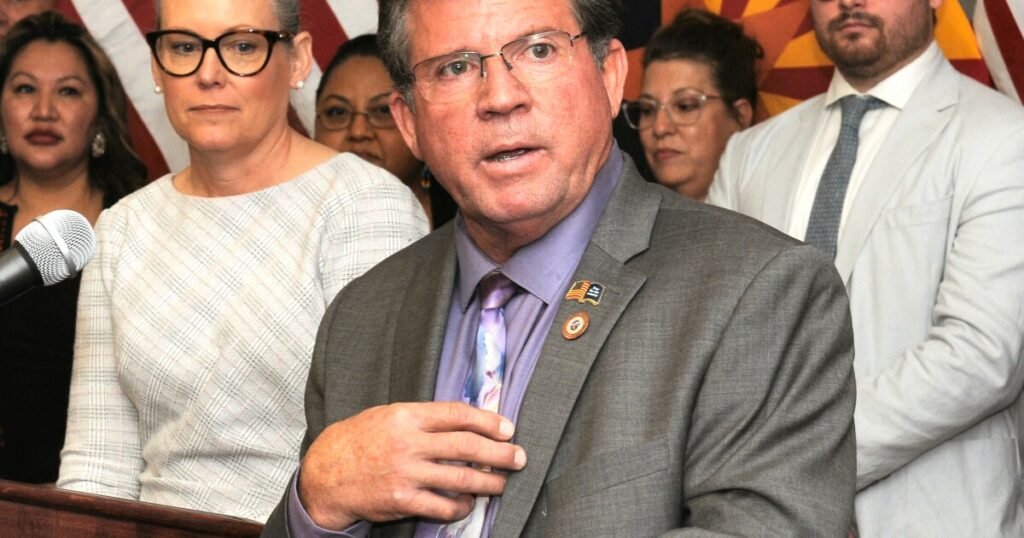Howard Fisher
Capitol Media Services
PHOENIX — Gov. Katie Hobbs on Monday signed a sweeping bill aimed at giving state health officials more power to monitor, fine and even shut down nursing homes that put patients at risk.
The bill specifically requires the Department of Health Services to establish minimum training standards for staff caring for residents with “memory impairment” issues. But with the development of a bill during the session, HB 2764, it now encompasses the entire long-term care industry, which the governor says will make a big difference in ensuring residents not only receive the care they need, but also that facilities that don't meet the standards will be subject to heavy fines.
Hobbs says that no longer exists.
“There is a desperate need for real retribution,” the governor said.
“Currently, the maximum penalty for a violation is a $500 fine,” she said.
HB 2764, authored by Republican Rep. Tim Dunn of Yuma, not only doubles the fine to $1,000 but allows the amount to be calculated for each affected patient, and there is language allowing for additional penalties based on the scope and severity of the violation.
What this bill means is that owners cannot avoid penalties by simply transferring their license to another entity, which then starts business with a clean slate.
It would also close a loophole in state law that allows operators to keep their licenses forever by simply paying a yearly renewal fee. The new law would allow operators to be shut down if they don't pay the fines.
Hobbs said HB 2764 goes beyond regulating nursing homes.
“The issues we've mentioned today are not limited to one or two types of facilities, nor are they specific to long-term care,” she said. “This bill provides important reforms for all health care organizations.”
Specifically, Hobbs said that means giving the health department new tools to “crack down on rogue health care facilities that are using illegal billing practices to fuel the sober living facility crisis.”
There have been numerous cases of individuals, many from Native American communities, being persuaded to commit themselves to what were supposed to be residential treatment facilities, but multiple investigations have revealed that the operators were simply using the identities to bill state and federal governments for services that were never provided.
“It is critical that people struggling with behavioral health and substance abuse issues are able to seek the help they need in a safe, supportive environment and be put on the path to true recovery,” said Gila River Indian Community Governor Steven Lo Lewis.
Dunn said the bill the governor signed Monday was five years in the making.
He said it started with a task force created by then-House Speaker Rusty Bowers, who then created a list of priorities.
But completing the process wasn't easy, Dan said.
“We started to chip away at those priorities,” he said, with some being implemented along the way, such as outsourcing some of the testing to independent companies.
But Dunn acknowledged that much of what has been done so far has been “low hanging fruit” — including $300,000 for an audit of Adult Protective Services — and credited the report with helping to focus on what still needs to be done.
He said passing comprehensive legislation would mean creating an entirely new type of license that didn't exist before for care homes that want to offer dementia care services.
This specifically gives the Health Department the authority to establish minimum training standards and annual continuing education requirements for employees and contractors.
And coming up with a package will require bipartisan cooperation, Dunn said.
He credited former Rep. Jennifer Longdon, and Rep. Hobbs, who raised the issue of inadequate oversight in her State of the State speech, for helping bring it all together.
“The timing was good,” he said.
Further helping to drive the issue was the very public push by Cathy McDavid, whose mother, Joan Thompson, a resident of a dementia care facility in Bethesda Gardens in north Phoenix, was beaten to death by another resident three years ago.
McDavid said one of the promises she made at the time was to do everything she could to promote long-term change, which prompted her to contact a reporter to tell her story and “raise awareness and bring it to the attention of people who have the power to make things happen.”
“Today, we did the right thing by improving the quality of life for our loved ones living in our facilities and doing everything we can to keep them safe,” she said.
When Governor Hobbs signed the bill, he told McDavid that it was for “my mother and all the other Arizonans who entered these facilities seeking help but received only excuses and substandard care, and who deserve better.”
Still, proponents of the reforms say they haven't achieved everything they hoped for.
Dana Kennedy, AARP's Arizona chapter president, said the group is looking for a video surveillance system that would allow family members to set up a closed feed and check in around the clock to see exactly what's going on in a patient's room.
“I believe we need to provide families with the technology to monitor their loved ones who are in long-term care facilities,” she said.
Kennedy said he would like to see a system where facility owners cannot deny permission, but participation is voluntary for families and there are costs associated with installing the equipment and bait.
She also said privacy concerns could arise if patients share a room with others.
—–
About X and threads: @azcapmedia







